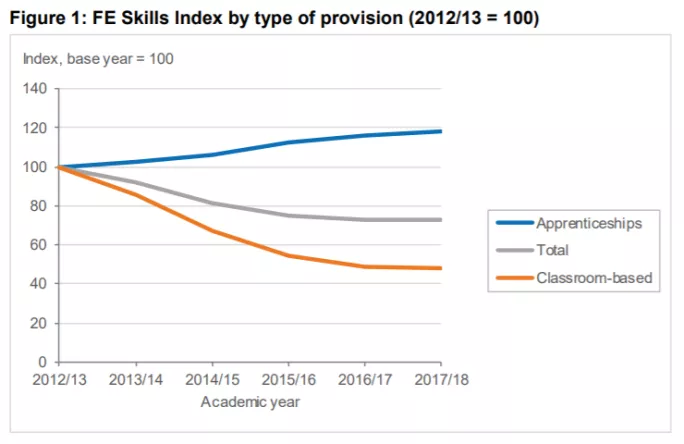The Department for Education's Skills Index, measuring the impact of further education and skills on productivity, has dropped by over 25 per cent in five years, it has been revealed. The index, which was set at 100 for 2012-13, stands at 73 this year, according to new figures published this morning.
The index uses increases in earnings attributable to different types of training, and uses that to estimate a total impact on productivity. It is intended to be “a simpler, more tractable measure that we can use to monitor changes in the value added of the FE and skills system over time”, said the government report.
“The overall FE skills index has decreased each year since 2012-13, largely driven by a reduction in learners achieving classroom-based qualifications,” according to the report. “This decrease has slowed since 2014-15 and there was no change in the overall index in 2017-18”.
Opinion: 'Boost adult education spending or UK will lag behind'
Other news: UK ‘will drop’ in world literacy and numeracy table
More on this: Government urged to give adults lacking functional skills access to training
Value-added
It goes on to stress that the total value-added for apprenticeships has increased every year since 2012-13, and rose by 2 per cent in 2017-18, while the total value-added for classroom-based training has decreased every year since 2012-13, due to a “large decrease in the number of achievements at full level 2 and full level 3, which has stabilised in the most recent years”.
“Apprenticeships accounted for 36 per cent of the total value-added in 2012-13, increasing to 58 per cent in 2017-18. Over the same period, classroom-based full level 2 training has decreased from 37 per cent of the total value-added to 22 per cent. Most of the change in value-added is due to a change in the number of achievements at each level.”
The index also assess the value added per learning, and according to the report, that measure increased between 2012-13 and 2016-17, “in part due to a shift towards apprenticeships over classroom-based qualifications; apprenticeships typically have higher employment rates and higher wage returns”. However, it fell by 2 per cent in 2017-18, due to a fall for classroom-based qualifications.
'Invest in adult learning'
Stephen Evans, chief executive of the Learning and Work Institute, said: “It is deeply troubling that the Skills Index has fallen by more than 25 per cent over the past five years. This is the result of falling participation in learning by adults as funding has been cut.”
He added this mirrored research showing progress improving skills had stalled and “that we risk falling further down the international skills league tables by 2030”. “This harms productivity, living standards, local communities and individual life chances. The government highlight that any improvement in quality will show up in the figures in future years, by the mid 2020s for current apprenticeship reforms. That’s true, but we need learning of the highest quality being taken up by more adults – we need both world class quantity and quality,” he added.
Mr Evans said: "The Skills Index provides yet more evidence that we need to invest more in adult learning and set a higher ambition.”
The government stresses the skills index is not intended to be a full assessment of the total value generated by FE and skills. “Training delivers economic value not captured by wage returns such as increased profits to employers, benefits to the Exchequer, and wider benefits to society rooted in greater and improved products and services.”





